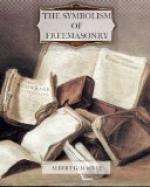This interpretation, although founded on a blunder, and in all probability an intentional one, soon became a precept, and has been strictly obeyed to this day.[125] The word Jehovah is never pronounced by a pious Jew, who, whenever he meets with it in Scripture, substitutes for it the word Adonai or Lord—a practice which has been followed by the translators of the common English version of the Bible with almost Jewish scrupulosity, the word “Jehovah” in the original being invariably translated by the word “Lord.” [126] The pronunciation of the word, being thus abandoned, became ultimately lost, as, by the peculiar construction of the Hebrew language, which is entirely without vowels, the letters, being all consonants, can give no possible indication, to one who has not heard it before, of the true pronunciation of any given word.
To make this subject plainer to the reader who is unacquainted with the Hebrew, I will venture to furnish an explanation which will, perhaps, be intelligible.
The Hebrew alphabet consists entirely of consonants, the vowel sounds having always been inserted orally, and never marked in writing until the “vowel points,” as they are called, were invented by the Masorites, some six centuries after the Christian era. As the vowel sounds were originally supplied by the reader, while reading, from a knowledge which he had previously received, by means of oral instruction, of the proper pronunciation of the word, he was necessarily unable to pronounce any word which had never before been uttered in his presence. As we know that Dr. is to be pronounced Doctor, and Mr. Mister, because we have always heard those peculiar combinations of letters thus enunciated, and not because the letters themselves give any such sound; so the Jew knew from instruction and constant practice, and not from the power of the letters, how the consonants in the different words in daily use were to be vocalized. But as the four letters which compose the word Jehovah, as we now call it, were never pronounced in his presence, but were made to represent another word, Adonai, which was substituted for it, and as the combination of these four consonants would give no more indication for any sort of enunciation than the combinations Dr. or Mr. give in our language, the Jew, being ignorant of what vocal sounds were to be supplied, was unable to pronounce the word, so that its true pronunciation was in time lost to the masses of the people.
There was one person, however, who, it is said, was in possession of the proper sound of the letters and the true pronunciation of the word. This was the high priest, who, receiving it from his predecessor, preserved the recollection of the sound by pronouncing it three times, once a year, on the day of the atonement, when he entered the holy of holies of the tabernacle or the temple.
If the traditions of Masonry on this subject are correct, the kings, after the establishment of the monarchy, must have participated in this privilege; for Solomon is said to have been in possession of the word, and to have communicated it to his two colleagues at the building of the temple.




